 |
 |
 |
Sorry, Bunnies – better late than never.
Ginga Kikoutai Majestic Prince – 18
 |
 |
 |
 |
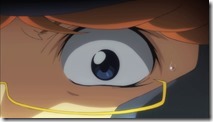 |
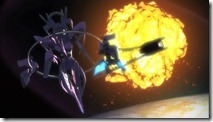 |
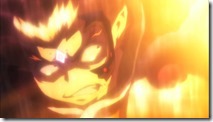 |
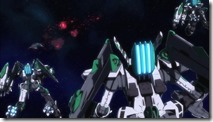 |
 |
 |
 |
 |
 |
 |
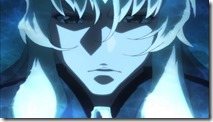 |
Certain things have been very consistent with Majestic Prince, among them superb battle choreography and a tendency to lapse into annoying cliche. And this episode certainly had both. Was it really necessary to have Suzukaze scold Team Rabbits for breaking a few windows when they’d just saved the school and the asses of everyone in it? Yes, it was supposed to be played for comedy – but the whole point is that it’s not funny. I could see it coming for miles away, I prayed they wouldn’t go there, and groaned when they did.
That sort of thing isn’t the biggest deal in the world but it is an irritant, but GKMP is certainly capable of better than that. The rest of the ep was the series’ usual standard, rock-solid ultra-orthodox mecha fare well-executed. The aforementioned battle sequence was again excellent, even if the end result wasn’t much of a surprise. You had to figure Klein was going to be the first to die among the named characters – it was long overdue and he was a reckless rogue even among his own people.
As usual, probably the most interesting element of Majestic Prince is the dynamic among the Wulgaru. The demise of Rada is further proof of both Jiart’s ruthlessness and his place as the real power among the Wulgaru – in essence, he and Theoria seem to be the only ones that really matter. His curiosity about the humans “unnatural” behavior and about what drove Theoria to do what she did seem likely to be the primary drivers for the ultimate resolution of the series. As for the personal side of things on the human side, it was mostly a week off – Patrick chickening out on confessing to Tamaki was about as dramatic as things got there.
Kamisama no Inai Nichiyoubi – 06
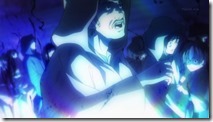 |
 |
 |
 |
 |
 |
 |
 |
 |
 |
 |
 |
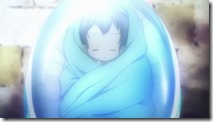 |
 |
 |
This really is a zombie series with a difference. There are times when the narrative is a bit muddled, which I suspect is mostly due to pacing issues in trying to cram too much story into one cour of episodes, and neither Ai or Toyasaki Ai’s portrayal of her is really on the same level as the rest of the series. But there’s still an overall drive that really works, and Kaminai is filled with some of the most striking individual moments of any show this season.
We’re at an interesting point here in having finished two arcs at the halfway point of the show, each of which seems to be interesting enough to have been a full series in their own right. It’s frustrating, but a credit to the dense emotional and intellectual content of Kaminai that it works as well as it does. I really liked Ortus despite the absence of Hampnie Hambert – I liked the physical setting, I liked the premise, I liked the characters. I especially like the way it continues to play with the subtle and difficult morality of this post-abandonment world, which is really at the heart of what this series is about.
The revelation that Ulla is the “Idol of Murder” didn’t come as a big surprise, nor the fact that she knew about it. The real issue wasn’t the secret itself, but its implications. In this world, can we really say that what Ulla was doing was wrong, even if there seems no doubt that it was murder by any conventional definition? I can’t even really take issue with the way Ortus has set up their system – children of immigrants given until the age of 15 to choose whether to die and stay, or live and forge their way elsewhere. The dead were driven to Ortus by their mistreatment outside it, and seem to have forged a peaceful and even meaningful existence inside it. Do they really owe it to the living to jeapordize that by throwing open their doors to breathers? It leads to some interesting cases like the Kimura Ryouhei character in the lion mask, ones which highlight the issues raised by the path Ortus has chosen. But he seems to be at peace with his choice, even as he did the right thing by trying to make sure Ai didn’t have her ability to choose her own future taken from her.
The development at the end of the episode was a bit sudden – a sleeping sister to Ulla, who refused from the womb the wish of her dying mother that she be an agent of death. I suppose Scar is not the first Gravekeeper drawn to Ortus by Celica’s call, just the first to reach her without being killed by Ulla first. As with the death of Hampnie in episode 3 the whole “she’s my daughter” bit suffered from the breakneck speed with which it was resolved, especially given that in this case we really have no emotional buy-in to begin with. I’ll reserve judgment until I see where the series goes with it, though at this point it feels like an unnecessary complication.
Blood Lad – 06
 |
 |
 |
 |
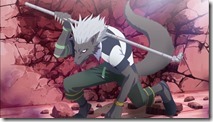 |
 |
 |
 |
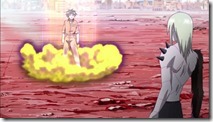 |
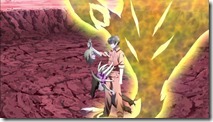 |
 |
 |
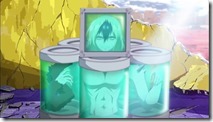 |
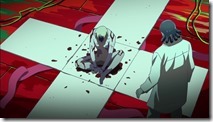 |
 |
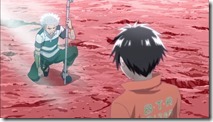 |
 |
 |
You know, there’s nothing especially revolutionary about Blood Lad but this show just delivers in terms of straightforward entertainment value, week after week. The cast is great (I like the fact that Brain’s Base got 11 year-old Sakaguchi Waku to add authenticity to chibi Staz), and I think the writing strikes a nice balance between honoring shounen tropes and gently satirizing them.
The formula of putting characters that are fun to watch in entertaining situations could hardly be simpler. I like almost all of the cast on their own and their are some quite interesting relationships brewing too. Wolf and Staz are a very solid take on the male friends/rivals theme, with the reality of just how big the gap between them made quite clear when child Staz (who tells Wolf after he drops from the sky that he wants to go to Japan to “meet Miyazaki Hayao”) needs to hold back to avoid killing him, despite having his powers sealed. The battle with Akim is never really in doubt once Staz unleashes a measure of his true talent – it’s easy to see why his brother is so obsessed with Staz, even is his true aims for his power are still a mystery.
I also like the increasingly complicated web developing between Bell, Fuyumi and Staz. Bell is obviously obsessed with power but increasingly flat-out smitten with Staz, too. She seems to be actively working on Fuyumi’s behalf with Franken, though she’s a character whose larger motives still seem mostly self-interested. Fuyumi herself isn’t very interesting but she serves her purpose – she’s the pivot point around which most of the conflicts are revolving – and in a cast with as many good characters as Blood Lad, it’s not a problem to have one who basically acts as a plot driver.





Rias Gremory
August 13, 2013 at 4:35 amLoved the Dragonball Z and FMA references in Blood Lad.
Ronbb
August 14, 2013 at 3:56 pmReading your review on Kaminai makes me want to pick it up again.